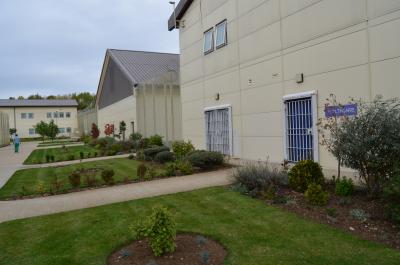Guest post by Dr Alice Ievins. Alice is a Research Associate on the Comparative Penology project, where she conducts ethnographic research into the imprisonment of men convicted of sex offences. This is the fifth post of Border Criminologies' themed series 'Penal Policymaking and the Prisoner Experience', organised by Ben Crewe.

Since most of my interviewees had started their sentence on a VPU, and talked a lot about what that part of their sentence had been like, in many ways, researching the VPU feels like travelling back in time. Indeed, spending time there has helped me to make sense of what people in Cat Cs say about their current experiences. Sex offenders in Cat C establishments regularly describe them as ‘not a real prison’. In fact, I’m quite often told ‘you’ve come to the wrong place if you want to understand what prison is about’. Prisoners talk about needing to behave themselves because they’re afraid of being transferred back to a VPU. It sometimes seems as though prisoners and staff are judging the Cat Cs by the standards of a more obviously painful and oppressive phantom prison, and can be quite quick to discredit the pains they do experience as neither significant nor relevant to researchers. Seeing how much more restricted, chaotic and unsafe the environment can be, helps to make sense of these descriptions. The wings are much louder, social relationships are denser, and there is a much more active and invasive prisoner economy, rendering the wings much less safe than in the Cat Cs. Prisoners in the VPU have very few work opportunities, and many spend 22-hours a day locked up. They are strictly kept apart from mainstream prisoners, making it very difficult for them even to leave the wing. If you start off your sentence on a VPU, moving to a Cat C does look like progress.
Being on the VPU has also helped me understand some of the collective techniques of neutralisation used in the Cat Cs. In my PhD research, I found that prisoners regularly claimed that people could be imprisoned for (apparently) minor offences, such as ‘“touching a bird’s arse in a nightclub” (fieldnotes); no prisoners claimed that this was what they had been convicted of themselves, nor did anyone provide specific examples of people who had been imprisoned for these actions’ (Ievins 2017, p.134). As I could not find anyone for whom these stories reflected their own experience, I argued that they were myths told to delegitimise the criminal justice system and demonstrate that people could be imprisoned for ‘apparently normal and not very serious offences’, thereby implying that they themselves were not necessarily bad people in for serious offences. In the VPU, however, where many people have quite short sentences, I have met people who have told me they were in prison because they sexually assaulted a woman in a nightclub. Does this mean that my earlier assumption that these accounts were mythological was wrong? I don’t think so, at least not entirely. I still maintain that these accounts had currency because they helped to make the case that not all sex offenders have committed ‘the worst offences’ – but hearing the stories which are told in the VPU has helped me to understand where these delegitimising narratives come from.

As a researcher, it can be quite useful that I know more than the VPU prisoners do about the rest of the prison system. The fact that I know where prisoners will be going, and what they’re likely to say about the VPU when they get there, means I can see what they don’t notice in their current situation, or at least that I can see what they don’t talk about. For example, when prisoners in Cat Cs look back on their time in VPUs, they often complain about how restricted their movement was, and how oppressive it felt to be constantly escorted by prison officers; the prisoners who are currently on the VPU almost never discuss these issues, but that does not mean they do not matter.
I am also struck by how different prisoners interpret the nature of their existence in these two types of prison. We are using the same interview schedule for both establishments, yet we receive strikingly different responses. For example, the same question (‘Can you tell me about the ways in which you have power in here?’) was understood by prisoners in the Cat C to refer to the amount of power prisoners had over their progression and their sentence, whereas those on the VPU reflected on whether they had power over the wing and other prisoners. It is in these assumptions that we can see what people take for granted, what they assume is significant, and what they believe to be inevitable. Doing research backwards does not make you omniscient, but it can help you to look beyond people’s current preoccupations, and think about why it is that those things matter to them at that moment.
Any comments about this post? Get in touch with us! Send us an email, or post a comment here or on Facebook. You can also tweet us.
__________
How to cite this blog post (Harvard style)
levins, A. (2018) Doing Research Backwards. Available at: https://www.law.ox.ac.uk/research-subject-groups/centre-criminology/centreborder-criminologies/blog/2018/05/doing-research (Accessed [date]).
Share:








